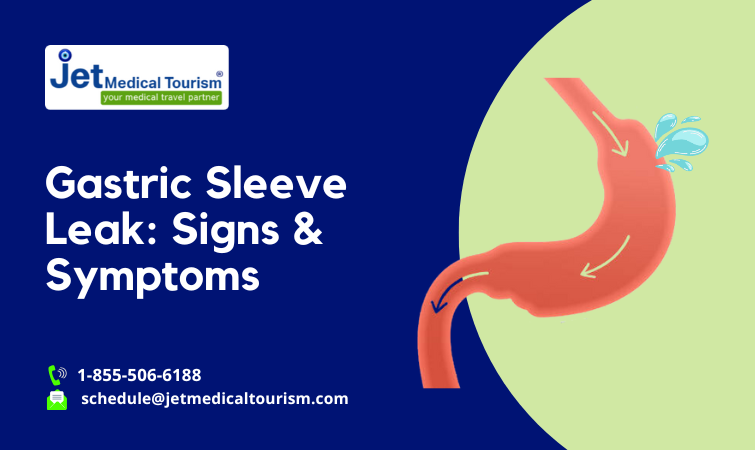Signs and Symptoms of Gastric Sleeve Leak
Any surgery comes with a measure of risk, and even though gastric sleeve surgery is quite safe, there are still some complications associated with the procedure.
One potentially life-threatening but rare complication is called gastric sleeve leak, and this occurs when digestive fluids from the stomach leak out through a hole or seam in the new stomach pouch and into the rest of the body.
Leaks can be fatal because digestive fluids contain substances that are meant to break down food. Once escaped, these fluids can then cause a great deal of damage to other organs, muscles, and tissues in the body.
As such, it’s imperative to be aware of the possibility of this complication following surgery, and be able to notice the indicators of gastric sleeve leak so you can seek medical attention immediately in the unlikely event that you encounter this problem.
Leaks tend to appear shortly after surgery
Because leaks involve a hole in the seam of the new stomach pouch, this complication typically arises within two to four weeks of the procedure and rarely occurs more than six weeks post-surgery. Therefore, if your gastric sleeve surgery was less than a month ago and you are experiencing the symptoms discussed here today, then it’s possible that you may have a leak.
According to data from 12,799 laparoscopic sleeve gastrectomy surgeries (LSGS) presented in the International Sleeve Gastrectomy Expert Panel Consensus Statement 2011, the leak rate was reported at 1.06%. However, the leak rate can vary, ranging from 1% to 3% for primary procedures and exceeding 10% for revision procedures.
Gastric sleeve leak symptoms: What does a gastric sleeve leak feel like?
A vast majority of VSG leaks are diagnosed within the first week after the surgery. These are called early leaks. In exceptional cases, the signs of gastric sleeve leak may appear later. These are clinically known as delayed leaks. All patients with this complication will require urgent gastric sleeve leak treatment. Here are some of the common gastric sleeve leak symptoms that should alert the patient and the healthcare provider to this condition:
- Persistent abdominal pain that may continue to worsen
- Shoulder pain and/or chest pain
- Rapid heart rate (tachycardia) of at least 120 beats per minute
- Tachypnea or respiratory distress with at least 19 breaths per minute
- Fever in excess of 98.6˚
- Dizziness
- Feeling of anxiety or illness
The medical team will also consider the following two clinical symptoms along with the physical gastric sleeve leak symptoms:
- An increased blood count of leucocytes (white blood cells)
- An increased level of C-reactive protein (CRP) in the blood
VSG leaks are rare, but their occurrence cannot be ruled out. You should remain vigilant and maintain your follow-up visits to the surgeon’s office.
Variable symptoms
It is noteworthy that the signs of a leak after gastric sleeve can vary depending on the when the leak occurred. For instance, patients with an early leak may reveal an increased heart rate, while delayed leak after gastric sleeve symptoms usually include mild or high fever.
Asymptomatic patients
In some cases, the patient may not develop any external or obvious symptoms, and may remain asymptomatic. In these cases, the doctors can diagnose a VSG leak with periodic monitoring of the patient using a gastric sleeve leak test, x-ray imaging, and blood tests.
Timely treatment
Even a small gap of one or two days can make a crucial difference to your gastric sleeve leak repair and treatment. Therefore, it’s critical to remain alert to any abnormal signs, especially in the early days and weeks after the surgery, and report any concerns to the surgeon.
Delayed leak after gastric sleeve symptoms
Although vertical sleeve gastrectomy (VSG) is a relatively simple bariatric surgery with a high success rate, some patients may develop early or delayed leak after gastric sleeve symptoms. Early leaks are relatively easy to manage, but delayed leaks usually require complex medical management. Here are some of the key facts related to delayed leak after gastric sleeve:
- Multiple co-morbidities are a high risk factor for late leaks.
- Long-term nutritional deficiency may contribute to late leaks.
- Delayed gastric sleeve leak symptoms are more likely to be noticed around the proximal third of the sleeve.
- Late presentation of VSG leaks usually occurs in the form of chronic fistulas and peri-sleeve abscesses.
- Endoscopic techniques to treat the delayed signs of gastric sleeve leak can vary according to the size and location of the perforation.
- Aggressive surgery may be required for a patient who presents with a gastric sleeve after 1 year, 2 years or more.
- A multidisciplinary approach to treat a delayed leak after gastric sleeve should involve a surgeon, radiologist, intensivist, and nutritionist.
Other warning signs to watch for
Pain isn’t the only symptom of gastric sleeve leak; there are other signs you should keep an eye out for as well, including:
- Dizziness
- Fever
- Shortness of breath
- Fast heart rate
What causes gastric sleeve leak?
A gastric sleeve leak can occur due to several factors, including:
- Poor Surgical Technique: Errors during surgery can lead to staple line issues or incomplete closure, increasing the risk of leaks.
- Inadequate Healing: Pre-existing conditions such as diabetes or autoimmune disorders can slow down the healing process, making the staple line more vulnerable.
- Nutritional Deficiencies: Lack of essential nutrients like protein or vitamins can weaken the tissue around the staple line.
- Increased Abdominal Pressure: Strenuous activities, vomiting, or improper diet soon after surgery can cause undue pressure on the healing staple line.
- Chronic Infections: Infections near the surgical site can lead to tissue breakdown and potential leakage.
Gastric sleeve leak after 1 year
Gastric sleeve leak after 1 year is a rare occurrence, and may only happen in one out thousands of patients. This late leak is considered a serious complication, and will involve complex gastric sleeve leak treatment. While early leaks are often treated using conservative treatment modalities, late gastric sleeve leak after 1 year is unlikely to heal with conservative approaches.
A research study has shown that a patient developed gastric sleeve leak symptoms, including fever, chills, and fluid buildup within 10 months after the VSG surgery. An endoscopy gastric sleeve leak test was conducted to diagnose the leak. After multiple conservative management attempts, the doctors had to perform an aggressive gastrectomy to treat the condition.
Gastric sleeve leak after 2 years
A gastric sleeve leak after 2 years is a highly severe complication, which can pose a significant risk to the patient’s life. Fortunately, these types of late leaks are an extremely rare occurrence. The signs of gastric sleeve leak after 2 years are more likely to develop in a patient with multiple obesity-related co-morbidities. A laparotomy may have to be performed in the abdominal cavity to drain the fluid and stop the leak.
A research study showed that a 65-year old patient developed gastric sleeve leak symptoms 2 years after VSG. He suddenly experienced pain and soreness in the lower abdominal area, followed by fever and pain in the left shoulder. The patient had type 2 diabetes, hypertension, COPD, and other co-morbidities. Doctors had to perform seven laparotomies and other medical management techniques over four months to treat the condition.
Gastric sleeve leak after 4 years
Is it possible to have a gastric sleeve leak after 4 years? Yes, clinically it is possible, but the chances of this occurrence are very rare. In the initial days, weeks or months, some patients may develop signs of a leak after gastric sleeve as the swelling subsides. Based on this, gastric sleeve leakage after 4 years is unlikely for most patients because the healing process would be completed in less than one year.
When the stomach has fully healed, the risk of a staple line leak is virtually eliminated. Moreover, dehiscence (separation) of the staple line wound, a bacterial infection, or an oxygen deficiency in the tissue around the staple line may contribute to a delayed leak after gastric sleeve even at 4 years. Late leaks should be seen as a major complication requiring urgent gastric sleeve leak repair, considering the high morbidity associated with it.
Gastric Sleeve Leak After 5 Years
Although exceedingly rare, gastric sleeve leaks may happen even after 5 years in exceptional cases. Patients with chronic health issues or previous staple line infections are at a slightly higher risk. Late leaks at this stage often require aggressive surgical intervention and prolonged medical care to ensure recovery.
Gastric sleeve leak test
Your bariatric surgeon may suspect an anastomotic leak if you complain of gastric sleeve leak symptoms, such as abdominal pain, shoulder pain, fast heart rate, dizziness, and anxiety. To confirm the diagnosis, they may perform a physical exam, blood work, and a gastric sleeve leak test. The test may include a serious upper GI tract x-ray or a CT scan.
Before the test, you will be asked to drink a contrast dye liquid, which will help create clear diagnostic images. If the results of the gastric sleeve leak test show that the colored dye is leaking through the gastric tube, it will confirm the diagnosis. In rare cases, the imaging tests may fail to reveal any signs of gastric sleeve leak. In this situation, an emergency lapartomy may be performed to look for a leak.
Gastric sleeve leak recovery
Recovery from a gastric sleeve leak varies depending on the severity and timing of the intervention. Here’s an overview of what patients can expect:
- Early Leaks: These are typically managed with prompt surgical repair or endoscopic interventions. Patients may require a short hospital stay, during which antibiotics and nutritional support are provided.
- Delayed Leaks: These may necessitate more complex procedures, such as stent placement, drainage, or revision surgery. Recovery can take longer, often requiring a multidisciplinary
How to prevent gastric sleeve leak
Preventing a gastric sleeve leak requires a combination of surgical precision and patient adherence to post-operative guidelines. Here are essential measures:
- Follow Dietary Guidelines: Stick to the dietary phases prescribed by your bariatric surgeon, starting with liquids and gradually introducing soft and solid foods.
- Avoid Strenuous Activities: Refrain from lifting heavy objects or engaging in high-intensity exercises during the initial recovery period.
- Stay Hydrated and Nourished: Ensure proper hydration and consume nutrient-rich foods to promote healing.
- Attend Follow-Up Appointments: Regular check-ups allow your surgeon to monitor your recovery and detect any potential complications early.
- Report Symptoms Promptly: Notify your healthcare provider immediately if you experience unusual symptoms such as severe pain, fever, or rapid heart rate.
Treatment for gastric sleeve leak
When a gastric sleeve leak does happen, emergency surgery is required. During the operation, your surgeon will locate and seal the hole, and then inspect surrounding tissue and organs for damage. Depending on the severity and volume of the leak, additional work may be required to repair damage caused by the digestive fluids.
Gastric sleeve leak FAQs
What is the most common time frame for gastric sleeve leaks?
Most gastric sleeve leaks occur within the first month post-surgery, specifically during the first two to four weeks. Early leaks are often linked to technical issues during surgery, while delayed leaks may stem from inadequate healing or chronic health conditions.
Can gastric sleeve leaks be treated non-surgically?
In some cases, small leaks may be managed non-surgically through endoscopic procedures, nutritional support, and the use of stents. However, more severe leaks typically require surgical intervention to repair the staple line and drain any accumulated fluid.
How can I differentiate between normal post-op discomfort and symptoms of a leak?
While mild pain and fatigue are normal after surgery, persistent or worsening abdominal pain, fever, rapid heart rate, and respiratory distress are red flags that warrant immediate medical attention. It’s always better to err on the side of caution and consult your surgeon if you’re unsure.
Can a gastric sleeve leak occur years later?
Yes, although it is extremely rare. Leaks can occur years later due to chronic infections, tissue breakdown, or complications related to other co-morbidities. Prompt medical evaluation is critical if symptoms suggest a leak, even years post-surgery.
Can a gastric sleeve leak heal on its own?
Small leaks might sometimes heal with conservative treatment, such as antibiotics and nutritional support. However, most cases require prompt surgical or endoscopic intervention to repair the leak and prevent further complications.
What tests can diagnose a gastric sleeve leak?
Diagnostic tests include physical examinations, blood tests to check for elevated white blood cells or C-reactive protein (CRP), and imaging studies like upper GI x-rays or CT scans. These tools help confirm the presence and location of a leak.
Can a gastric sleeve leak cause long-term issues?
If not treated promptly, a leak can lead to serious complications like infections, abscesses, or fistulas. Long-term issues can include malnutrition or the need for additional surgeries. Proper treatment and follow-up care significantly reduce these risks.
Conclusion
Skilled and qualified surgeons will monitor post-op patients closely in the days following surgery, and perform several inspections to look for leaks and other complications. Even though this complication is rare, it is still possible; therefore it’s crucial to know the signs and symptoms so you can keep yourself safe and healthy.
If you experience any of the symptoms talked about here today, contact your medical professional right away to discuss options.
Call us at (855) 506-6188 find out if you qualify for the gastric sleeve surgery. You can also fill our online application form or contact us to find out more about bariatric surgery procedures.




